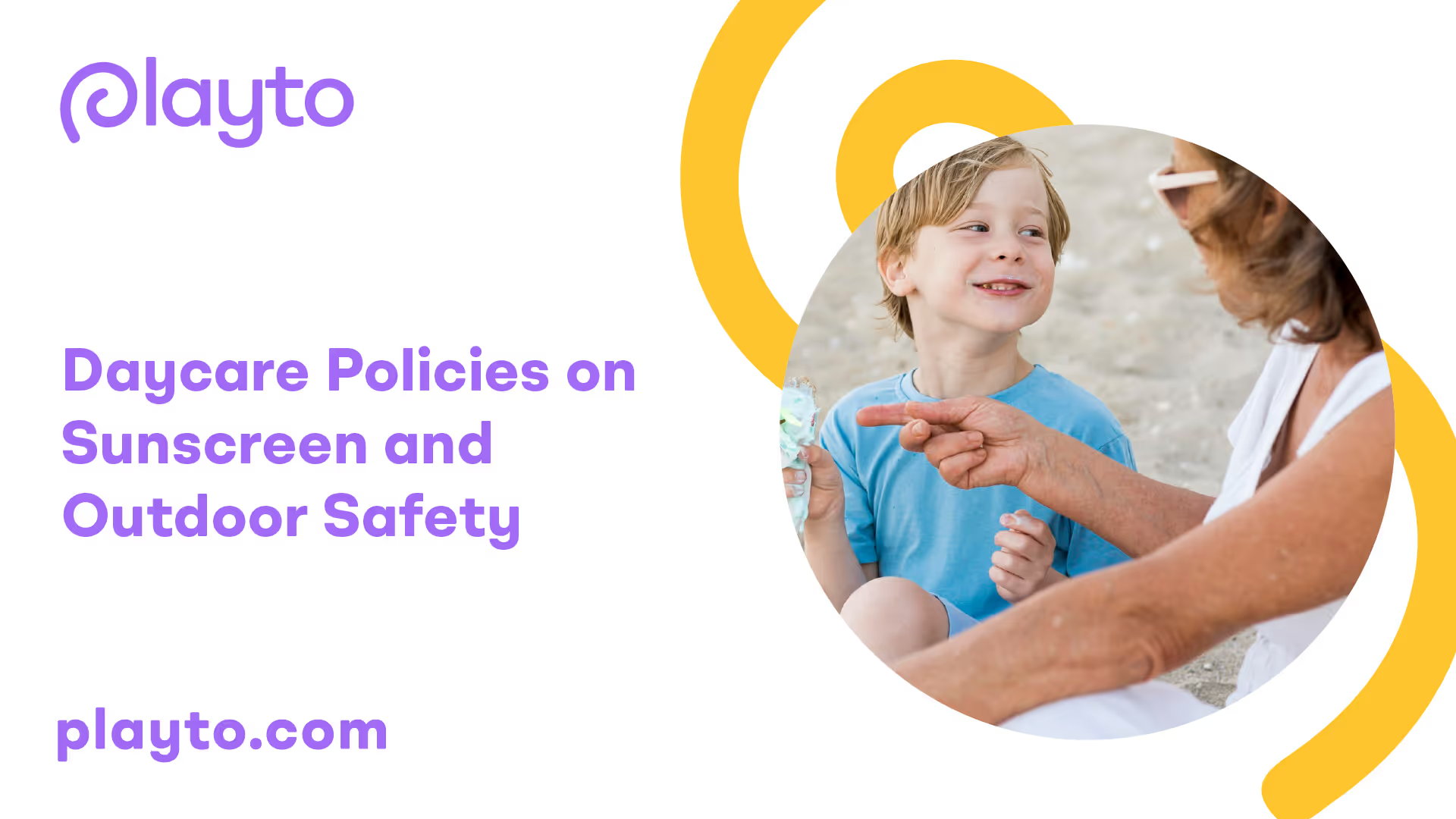Sun Safety Guidelines for Daycare Policies
Ensuring sun safety is an essential aspect of daycare policies, especially when it comes to protecting children from harmful UV rays. This section will outline specific guidelines for daycare policies regarding sunscreen use for babies under 6 months, selecting the right sunscreen for babies, and the importance of reapplication and timing.

Sunscreen Use for Babies under 6 Months
When it comes to babies under 6 months old, it's important to note that sunscreen should generally be avoided due to the potential harm from the chemicals. The American Academy of Pediatrics recommends keeping babies in the shade and dressing them in protective clothing to prevent sun exposure. The FDA also advises that infants be kept out of the sun during the hours of 10 a.m. and 2 p.m. and suggests the use of protective clothing if they must be in the sun. Infants are at greater risk than adults for sunscreen side effects, such as a rash. The best protection for infants is to keep them out of the sun entirely. It is advisable to ask a doctor before applying sunscreen to children under six months of age.
To align daycare policies with these recommendations, it is important to include guidelines that keep babies under 6 months out of direct sunlight. Dressing them in lightweight clothing that covers their arms and legs, along with using brimmed hats for sun protection, can help minimize their exposure to harmful UV rays. Providing shaded areas for outdoor play can also contribute to ensuring the safety of infants.
Selecting the Right Sunscreen for Babies
For children over the age of 6 months, selecting the right sunscreen is crucial. When choosing sunscreen products, daycare policies should recommend using products that have sun protection factor (SPF) of 30 or higher, as recommended by the FDA. It's important to look for products that provide broad-spectrum protection, meaning they protect against both UVA and UVB rays. The daycare policies should encourage the use of sunscreens that are specifically formulated for children's delicate skin, as these are less likely to cause irritation.
To ensure compliance with daycare policies, parents should be advised to provide sunscreen for their children and label it with their child's name. This will help prevent mix-ups and ensure that each child is using the appropriate sunscreen for their skin.
Reapplication and Timing
Daycare policies should emphasize the importance of regular sunscreen reapplication. Sunscreen should be applied at least 15 minutes before going outdoors and reapplied every two hours, or more frequently if children have been swimming or sweating excessively. Encouraging parents to provide written consent for sunscreen application and specific instructions from the child's doctor can help ensure that children receive appropriate sun protection.
By including guidelines on sunscreen use for babies under 6 months, selecting the right sunscreen, and emphasizing the importance of reapplication and timing, daycare policies can promote sun safety and protect children from the harmful effects of UV radiation. It is crucial to educate parents about these guidelines and collaborate with them to ensure the well-being and safety of the children in daycare.
Importance of Outdoor Play in Daycare
Outdoor play is an essential component of daycare programs, offering numerous benefits for children's development and overall well-being. It provides opportunities for children to engage in various activities that promote their social, emotional, physical, and cognitive growth. In this section, we will explore the importance of outdoor play in daycare, focusing on its social and emotional benefits, physical health benefits, and sleep and cognitive benefits.

Social and Emotional Benefits
Engaging in outdoor play fosters social interaction and collaboration among children, enabling them to develop important social and emotional skills. Through outdoor play, children learn to navigate social dynamics, solve problems, take turns, encourage others, practice self-control, engage in safe risk-taking, and follow game rules. These experiences contribute to the development of their social and emotional competencies, which are essential for building positive relationships and navigating the world around them.
Physical Health Benefits
Outdoor play promotes physical health by encouraging children to participate in activities that build gross motor skills, such as running, jumping, climbing, throwing, and kicking balls. These activities help children develop their strength, coordination, and balance. Regular engagement in outdoor play can combat issues like obesity and related health problems by encouraging children to be active and maintain a healthy lifestyle [4]. Additionally, spending time outside allows children to get exposure to natural light, which can enhance their mood and support their overall well-being [5].
Sleep and Cognitive Benefits
Outdoor play has been linked to improved sleep patterns in children. Spending time outside exposes children to natural light, which helps regulate their internal body clock and promotes better sleep at night. Additionally, engaging in physical activity during outdoor play can contribute to better sleep quality. Adequate sleep is crucial for children's cognitive development, as it supports memory consolidation, attention span, and overall cognitive functioning.
Incorporating outdoor play into daycare programs provides children with valuable experiences that support their social, emotional, physical, and cognitive development. By creating a safe and engaging outdoor environment, daycare providers contribute to the overall well-being of the children in their care. It is important for daycare policies to prioritize and encourage outdoor play to ensure children have opportunities to reap these benefits.
Sun Protection Measures for Children
When it comes to ensuring the safety of children in daycare, implementing effective sun protection measures is crucial. This section will outline key guidelines for sun protection, including sunscreen application, proper clothing and accessories, and avoiding peak sun hours.

Sunscreen Application Guidelines
For children over the age of six months, applying sunscreen is an essential step in protecting their skin from harmful UV rays. When selecting a sunscreen for children, it's recommended to choose one with at least SPF 30, with many baby-specific sunscreens offering SPF 50. These sunscreens are often formulated with special ingredients to prevent skin irritation.
To ensure proper protection, sunscreen should be applied generously to all exposed areas of the body. It's crucial to follow the instructions on the label for the recommended amount to use. Remember to pay attention to commonly missed areas, such as the ears, back of the neck, and tops of the feet.
Sunscreen typically lasts for about two hours, so it's important to reapply it every two hours to maintain its effectiveness. More frequent reapplication is advised if sweating excessively, experiencing skin burning, or spending time in the water [6]. Encouraging children to participate in the reapplication process can help them develop good sun protection habits from an early age.
Proper Clothing and Accessories
In addition to sunscreen, proper clothing and accessories play a vital role in sun protection. Dressing children in lightweight, long-sleeved shirts, long pants, and wide-brimmed hats can provide additional coverage from harmful UV rays. It's important to choose clothing made from tightly woven fabrics to minimize sun exposure.
Sunglasses with UV protection are also essential for protecting children's delicate eyes from the sun's rays. Look for sunglasses specifically designed for children that provide 100% UV protection. Encouraging children to wear sunglasses can help protect their eyes from both short-term and long-term damage caused by sun exposure.
Avoiding Peak Sun Hours
To minimize sun exposure, it's crucial to avoid the peak sun hours between 10 a.m. and 2 p.m. during which the sun's rays are the strongest. During these hours, children should be encouraged to engage in shaded activities or indoor play to reduce their risk of sunburn and heat-related illnesses.
Teaching children about the importance of seeking shade during these hours and encouraging them to take breaks from direct sunlight can help instill good sun safety habits. Creating shaded play areas or utilizing umbrellas and canopies can further enhance sun protection in outdoor daycare settings.
By following these sun protection measures, daycare providers can help ensure the safety and well-being of children in their care. Implementing comprehensive sun protection policies and educating both staff and parents about the importance of sun safety will go a long way in preventing sunburns and promoting a healthy outdoor experience for children. For more information on daycare policies regarding safety, check out our article on daycare policies on safety.
Implementing Sunscreen Policies in Daycare
To ensure the safety and well-being of children in daycare, it is important to establish clear policies regarding sunscreen usage and protection from the sun. When implementing sunscreen policies, several considerations should be taken into account, including obtaining written consent and doctor's approval, defining application procedures and frequency, as well as proper storage and labeling.
Written Consent and Doctor's Approval
Before applying sunscreen to a child in daycare, it is crucial to obtain written consent from parents or guardians. Sunscreen is considered a non-prescription medication in child care programs and should only be administered with the express permission of parents or guardians. The written consent should specify when sunscreen should be applied and should come with the supplied sunscreen. It is important to note that sunscreen is not recommended for infants under 6 months old, as per FDA guidelines. Instead, young infants should be protected from the sun by using hats, long-sleeved shirts, long pants, and shade. If parents insist on sunscreen for infants, written permission and specific instructions from the child's doctor should be obtained.
Application Procedures and Frequency
Proper application of sunscreen is essential to provide adequate protection for children in daycare. Sunscreen should be applied approximately 30 minutes before going outside and should be generously applied to all exposed body parts, including hands, ears, feet, shoulders, and behind the neck. Reapplication every 2 hours while in the sun is essential, and more frequent reapplication is necessary if children are swimming or playing in water. Following these guidelines helps ensure that children receive continuous protection from the sun's harmful rays.
Storage and Labeling
Proper storage and labeling of sunscreen in daycare settings are crucial for both safety and organization. Sunscreen should be stored like other medications, in a locked area that is inaccessible to children. Each child should have their own individual sunscreen bottle, labeled with their name to prevent any confusion or mix-ups. This labeling practice ensures that children receive the correct sunscreen and reduces the risk of any allergic reactions or other adverse effects [3].
By implementing clear policies for sunscreen usage in daycare, including obtaining written consent and doctor's approval, establishing application procedures and frequency, and ensuring proper storage and labeling, daycare providers can effectively protect children from the harmful effects of the sun. It is essential to prioritize the health and well-being of children by providing a safe and sun-protected environment in daycare settings. For more information on daycare policies and safety, check out our article on daycare policies on safety.
Outdoor Play and Children's Development
Outdoor play plays a vital role in the development of children, offering numerous benefits across physical coordination and strength, cognitive skills development, and social skills enhancement.
Physical Coordination and Strength
Engaging in outdoor play activities helps children improve their physical coordination and strength. Activities like swinging, climbing, and running require children to coordinate their movements, enhancing their balance and motor skills. For example, swinging engages all their muscles to hold on and sit up, contributing to improved muscle strength.
Outdoor toys such as bikes, skateboards, and scooters also provide opportunities for children to engage and strengthen their muscles. These activities require balancing, pedaling, and steering, which further enhance their coordination and physical abilities.
Cognitive Skills Development
Outdoor play fosters the development of cognitive skills in children. When children play outside, they have the opportunity to explore and interact with their surroundings, promoting observational and reasoning skills. They learn to see the world from different perspectives, be aware of the space they're in, and understand concepts like cause and effect. This increased exposure to the environment helps develop greater self-awareness and enhances their ability to think critically [5].
Additionally, outdoor play encourages creativity and imagination. Children can create games, build structures, and engage in imaginative play, allowing their cognitive abilities to flourish. The openness of outdoor spaces provides children with the freedom to explore their interests and expand their intellectual horizons.
Social Skills Enhancement
Outdoor play provides an ideal setting for children to develop important social skills. Interacting with other children in a natural environment allows them to learn empathy, cooperation, and friendship. They have the opportunity to build genuine connections with their peers, encounter individuals from different backgrounds, and successfully engage in play with various children.
Through outdoor play, children learn to navigate social situations, resolve conflicts, and communicate effectively. They develop essential social skills that form the foundation of healthy relationships and contribute to their overall emotional well-being.
By incorporating outdoor play into daycare policies, children can reap these developmental benefits. It is important for daycare providers to create safe and stimulating outdoor environments where children can freely explore, interact, and engage in activities that promote physical, cognitive, and social development. Encouraging outdoor play not only enhances children's well-being but also fosters a love for nature and an appreciation for the world around them.
Ensuring Sun Safety in Daycare Policies
Daycare policies play a crucial role in ensuring the safety and well-being of children. When it comes to sun safety and outdoor activities, there are several important factors to consider. Daycare policies should take into account the impact of climate change, advocate for green spaces and tree planting, and prioritize the overall well-being of children.
Impact of Climate Change
Daycare policies should recognize the impact of climate change on heat-related illnesses and air pollution. As temperatures continue to rise, it becomes increasingly important to protect children from excessive sun exposure and heat-related risks. By acknowledging the effects of climate change, daycare policies can implement appropriate measures to mitigate these risks and ensure the safety of children [1].
Green Spaces and Tree Planting
Advocating for green spaces and tree planting is an essential aspect of daycare policies. Access to outdoor areas with ample shade and natural vegetation can provide children with a safer and more enjoyable environment for outdoor play. Trees offer natural protection from harmful UV rays, reducing the risk of sunburn and sun-related skin damage. Incorporating green spaces and encouraging tree planting can enhance the overall sun safety in daycare settings, creating a healthier outdoor experience for children.
Advocating for Children's Well-being
Daycare policies should prioritize the overall well-being of children. This includes promoting outdoor play as an integral part of children's development. Outdoor play offers numerous physical, cognitive, and social benefits. It helps children develop physical coordination and strength, enhances cognitive skills, and fosters social skills such as empathy, cooperation, and friendship.
By advocating for outdoor play and incorporating sun safety measures in daycare policies, children can reap the benefits of outdoor activities while staying protected from harmful UV rays. Ensuring sun safety in daycare policies not only safeguards children's health but also promotes their overall well-being and development.
To learn more about other essential daycare policies, such as teaching basic safety skills and pick-up and drop-off procedures, explore our related articles on teaching basic safety skills in daycare and daycare pick-up and drop-off procedures.
